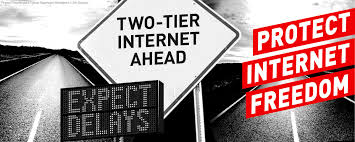
On December 14, 2017, the FCC voted to repeal net neutrality rules in a 3-2 vote along party lines and signaling a victory for telecommunications companies, according to the Los Angeles Times. Now lawmakers are fighting back and in mid-January, CNET reported that Democrats announced all 49 of their senators, and one Republican, Susan Collins of Maine, will vote on a bill that uses the Congressional Review Act to reinstate the regulation.
Ajit Pai, the FCC chairman, thinks the repeal is a positive move and said, “The internet is the greatest free-market innovation in history….Entrepreneurs and innovators guided the internet far better than the heavy hand of government ever could have.”
However, there is much animosity against this ruling which came after months of many technology companies – including Google, Microsoft, and Facebook – fought to keep the 2015 Obama-era rules for net neutrality in place, fearing that its repeal will drive up prices from Internet Service Providers (ISP) such as Verizon and AT&T. These laws would effectively allow ISP’s to limit content or make some websites more expensive to view.
Google wrote the following statement:
“The Internet should be competitive and open. That means no Internet access provider should block or degrade Internet traffic, nor should they sell ‘fast lanes’ that prioritize particular Internet services over others.”
ISPs , on the otherhand, have denied that they will block or limit content. For instance, David L. Cohen, Comcast’s senior executive vice president, countered: “The FCC vote ‘does not mark the ‘end of the Internet as we know it;’ rather it heralds in a new era of light regulation that will benefit consumers.”
What Does The FCC Ruling Mean for Education?
As the new FCC rules go into effect, many education experts from the American Library Association (ALA) to the National Educational Association (NEA) are worried that without the net neutrality laws, schools, libraries, and universities could lose out. An editorial in Wired Magazine from the ALA wrote the following:
- “Schools…college libraries rely upon the public availability of open, affordable internet access for school homework assignments, distance learning classes… job-training videos, medical and scientific research… We must ensure the same quality access to online educational content as to entertainment and other commercial offerings.”
Fast Lanes: Quality and Speed of Digital Content
Many experts have expressed concern that the quality of educational digital content – such as video streaming — could be affected by the repeal of the net neutrality laws. Today, video streaming plays an important role – from online homeschooling courses to college and university lectures. In this new era, ISPs could charge content providers more for providing speedy digital content to consumers– also called “fast lanes” or “paid prioritization.”
Large companies with deep pockets such as Netflix, for instance, can afford “fast lanes.” But for smaller content providers, such as libraries and other smaller businesses trying to break into the market, paying for fast lanes could be cost-prohibitive and affect their ability to provide affordable educational and researchable digital content. This would “…make video conferencing, streaming lecture videos, or more experimental forms of distance learning less accessible,” reports Wired.
The NEA writes, “If the teacher is relying on Web tools to supplement classroom instruction, it’s possible some content would load more quickly than others if there was a deal for prioritized access via the school’s ISP.”
If the ISPs do apply fast lanes and other “paid prioritization” charges, education and small business experts worry that entrepreneurs who are creating educational content might not be as eager to go to market – and thus this state of affairs could stifle innovation. Save the Internet writes that net neutrality is crucial for startups and entrepreneurs, “…who rely on the open internet to launch their businesses… foster job growth, competition and innovation.”
The NEA also contends that if content providers pay more for fast lanes, they may, in fact, pass this extra charge onto consumers and budget-strapped schools and universities.
ISP Preferred or Limited Content?
Many education experts fear that another consequence of the repeal of net neutrality laws is that ISPs could limit or prioritize some web content over another. For example, a student might be researching a certain topic for a paper, but depending on his or her ISP, certain content may or may not be available.
The NEA writes, “…if an ISP is able to block, degrade or prioritize some content over others, the internet service provider is the one making the decision about what you will access online.”
Education experts are expounding in editorials and news coverage that the purpose of an open internet connection is the ability to choose the information or resources available – no matter which ISP is being used. According to CNBC, many ISPs have such as AT&T, Comcast and Verizon have made statements reassuring consumers that they will “not discriminate against content.”
Education Week writes in an editorial that the education industry must be steadfast and get ready to respond if any of the fears of limited content, fast lanes, and other issues come to light in the next few months. “The loss of Net Neutrality threatens the very academic freedom we have fought for. We must pay attention and speak out.”
DiamondIT has been helping school districts find and support the applications needed to keep a school running smoothly. DiamondIT can offer private cloud solutions where key applications can be hosted and managed by DiamondIT’s expert IT team. Call 877-716-8324 to learn more.


